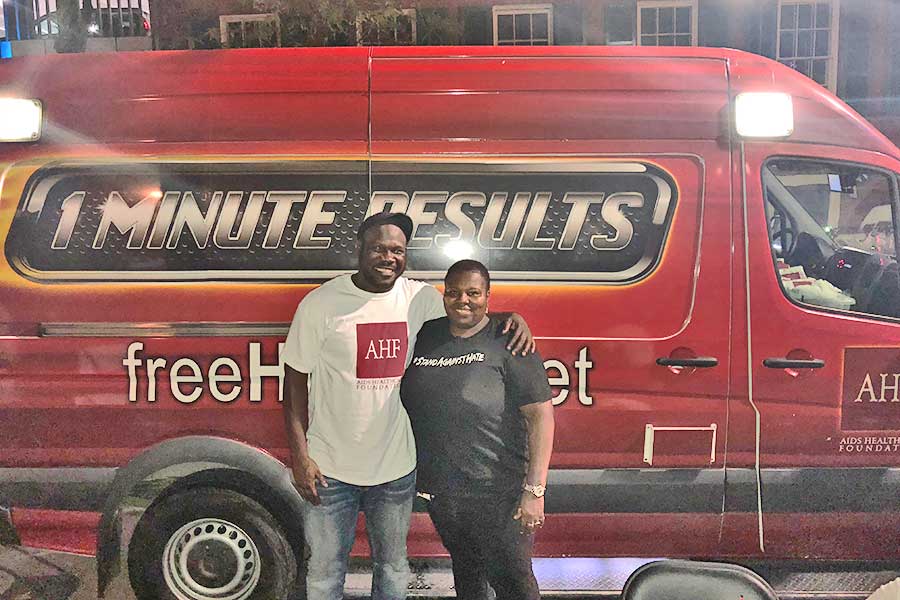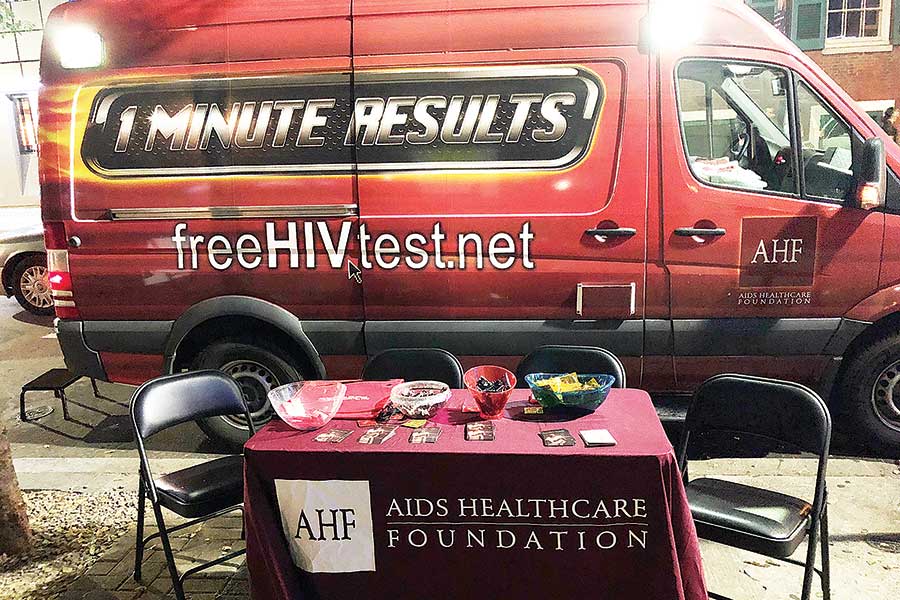
A new mobile-testing van is letting Philadelphians take advantage of free HIV testing.
The AIDS Healthcare Foundation is making testing and treatment options more accessible with a specially equipped van that makes weekly stops around the city.
Gone are the days of secretly slipping into a Planned Parenthood, health clinic or doctor’s office for an HIV test. Since 2012, the AIDS Healthcare Foundation has provided more than one million rapid HIV tests through its mobile-testing van in cities such as San Francisco, New York, and now, Philadelphia.
“The van allows us to go to parts of the city that don’t easily offer these services,” said Quincy Greene, a testing counselor at AHF’s Philadelphia location. “We’re doing all we can to make HIV testing and conversations about HIV prevention available to people who don’t live in Center City or don’t often travel downtown.”
AHF, the largest global AIDS organization that services more than 950,000 patients in 41 countries, opened its new healthcare center and pharmacy in Center City in May. Since August, Greene and his mobile-testing-team have issued more than 1,000 free one-minute HIV tests in locations including Woody’s bar in the Gayborhood, Walnut Street, the Frankford Transportation Center, Broad Street, and Snyder and Allegheny avenues.
With different sites come different demographics, said Roberta Gallaway, another testing counselor at AHF. In many locations in Center City, AHF prioritizes identifying new cases of HIV in men who have sex with men (MSM).
“Downtown is where so many people who are positive congregate because all of the services are downtown and we’ve seen that there’s less stigma attached to HIV-positive people as opposed to people living in other parts of the city,” Gallaway said.
This year, Greene said he and his mobile team are working to get at least five more sites approved for testing.
The van, which has two confidential testing rooms, is parked outside of the pre-approved testing sites for three to four hours a day. Participants must sign a consent waiver before they are tested. Two testing counselors are available on-site to administer the one-minute tests, and participants are asked 33 survey questions based on their lifestyles. The process takes up to five minutes.
An average of 25 people are tested for free at each site, Greene said. Those who are tested can also be referred to treatment services at AHF’s pharmacy.
Greene regularly submits proposals to the city’s health department to target areas that have large populations of MSM or intravenous drug users.
“We can’t test wherever we want. Based on epidemiological data, we have to show if the area has a high prevalence rate of HIV and if we can reach our targeted demographic,” Greene said.
In locations such as Frankford, the targeted demographic is intravenous drug users.
“You can see how opioids have taken over, especially in the Frankford area. HIV and hepatitis-C rates have spiked because of the mode of transmission,” Gallaway said during a recent weekly stop for testing outside the Frankford Transportation Center.
The city has a seen a surge in new HIV cases found in IV drug users. CHART — the health department’s monthly publication on underreported health issues in Philadelphia — cited 46 newly diagnosed cases of HIV among people who inject drugs between August 2017 to August 2018. That represented a 48 percent increase compared with the 31 cases found in the previous 12 months. Fifty-seven percent of the new HIV, non-AIDS diagnoses among people who inject drugs were also infected with hepatitis-C.
“Through the mobile unit, we have identified at least a dozen people who have contracted HIV,” Greene said. “We’re approaching mobile testing as they do it around the country — which is stop and go. In Philly, you have to get the sites approved throughout the week and then you can go to that site, but only on that approved day.”
One mobile-testing participant, who requested anonymity, said she was scared to know her status. She spent 14 years battling drug addiction — first with heroin and now fentanyl. She already contracted hepatitis-C by sharing needles with someone who didn’t disclose his status and said she was afraid of having HIV.
“I saw the truck parked outside the [Frankford] terminal and thought it would be best to get checked out,” she said.
The 55-year-old said she had unprotected sex with strangers and still actively shares needles during her drug use. After gentle coaxing from testing counselor Greene about the importance of knowing her status, she stepped into the van to receive testing. After six minutes, she exited with a negative HIV status and a referral for hepatitis C treatment at AHF’s pharmacy.
Fredrick Micicki, 24, also received an HIV test at the Frankford site. He said the last time he was tested was in jail a year ago, and he felt it was time to get another check up.
“It’s convenient to have the truck here offering free tests. I don’t have a job and getting money to get to some of these places is not always easy. Getting this card that says I’m HIV-negative is so empowering,” he said.
Along with confirmation of his negative status, Micicki also received a referral for PrEP after disclosing to his tester that he frequently engages in unprotected sex and occasional heroin use.
Greene said he makes it a point to have conversations with the people he tests beyond asking the routine survey questions.
“You never know how much you’re able to impact someone during that time. I like to dive deeper into people’s actions and decisions when it comes to why they engage in risky behavior,” he said. “There are real people and real stories behind the data we collect and the statistics we see.”
